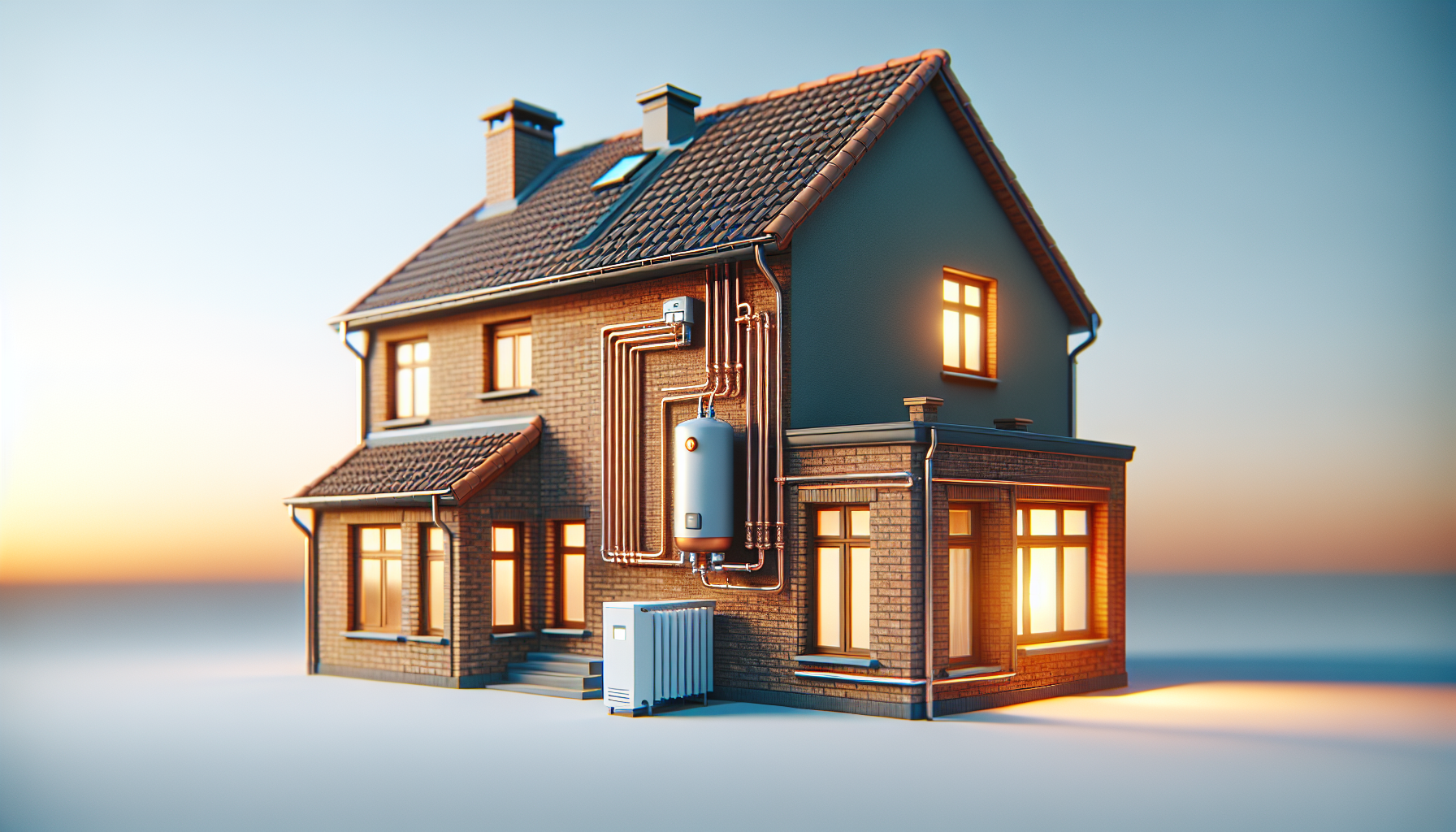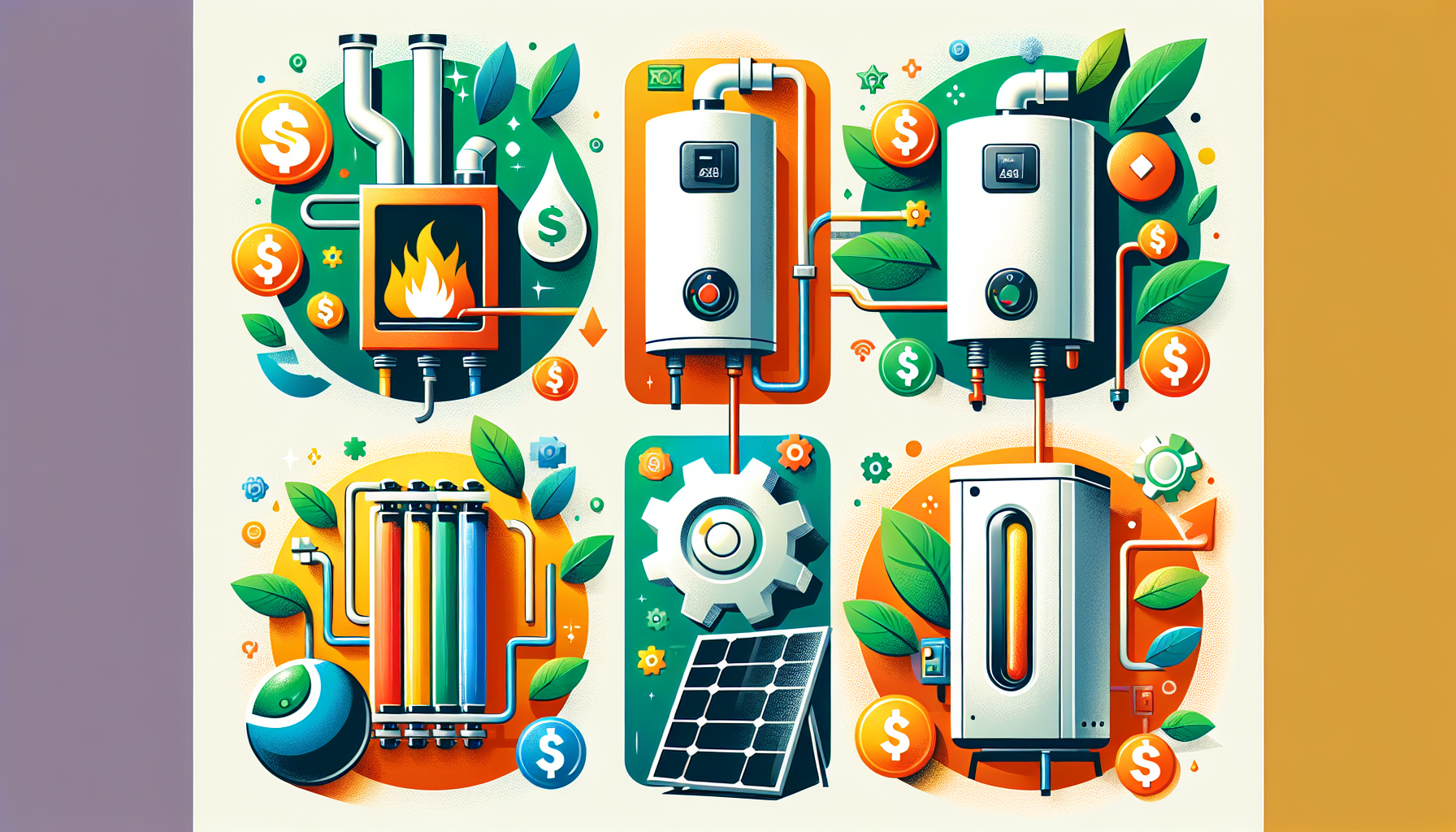Efficient Hot Water System Gas Solutions: Your Guide to Upgrade and Install with InstalledToday.com.au
Are you tangled in the decision of choosing a hot water system? Gas hot water systems offer a blend of rapid heating and cost-effectiveness, but are they right for your home? We’ll help you navigate through the intricacies of gas systems, including selecting the right model, understanding the installation process, and managing the operation costs. Step into a world of informed choices with our essential guide to gas hot water systems.
Key Takeaways
-
Gas hot water systems, such as storage tank and instantaneous models, provide rapid heating and are suitable for various household sizes and demands, with additional benefits like energy efficiency.
-
When selecting a gas hot water system, one should consider household size and demand, existing infrastructure, and the proximity of installation to high-use areas, ensuring optimal performance and energy savings.
-
Comparing types of gas hot water systems, including their costs, lifespan and maintenance requirements, is essential for making an informed decision, with professional installation and regular upkeep crucial for safety and efficiency.
Gas hot water systems Explained

Gas hot water systems, including the gas hot water unit, are renowned for their ability to heat water rapidly, often allowing for smaller tank sizes compared to electric hot water heaters. This swift heating capability allows these systems to meet household hot water needs efficiently, providing you with that relaxing hot shower just when you need it.
These systems come in two main types: storage tank systems and instantaneous systems, each with their unique operational characteristics and advantages. Whether you’re a fan of long, leisurely baths or need a continuous supply of hot water for multiple outlets, there’s a gas hot water system that’s just right for you.
Types of Gas hot water systems
The two main types of gas hot water systems are storage tank systems and instantaneous systems, each offering distinct advantages to cater to varied household needs. Storage tank systems store heated water, ready for use, while instantaneous systems, also known as tankless systems, heat water on demand, activating only when a hot water tap is turned on.
A storage tank system is a good choice if your household has high hot water demand, while an instantaneous system might be perfect for smaller households with lower hot water requirements. With a tankless system, you’ll never have to worry about running out of hot water in the middle of a shower again!
How Gas Hot Water Systems Work
In a gas storage hot water system, a gas burner heats the water underneath an insulated storage tank, ensuring the water is maintained at a constant temperature for immediate use. On the other hand, in tankless gas hot water systems, water is heated only when needed by passing through special piping with heating elements, eliminating the need to store and continuously reheat water.
These systems can be supplied by natural gas connections or LPG bottles, with natural gas typically providing a more cost-effective and convenient option. Some storage systems even employ innovations like twice-burnt gases to increase recovery rates and enhance energy efficiency, ensuring you have a reliable hot water supply while keeping energy consumption in check.
Factors to Consider When Choosing a Gas hot Water System

There are several crucial factors to consider when selecting a gas hot water system. Household size influences the system’s capacity needed to meet hot water demand, while existing infrastructure, such as space for installation and gas connections, must also be compatible with the system being considered.
Household Size and Hot Water Demand
The size and type of gas hot water system you opt for is greatly influenced by your household size and hot water needs. On average, an individual’s hot water usage is approximately 50-100 liters per day. Thus, larger households tend to require systems with larger capacities.
You also need to take into account peak usage periods, like in the mornings when everyone is likely to shower. These periods necessitate larger tank sizes to meet the higher demand.
It’s prudent to consider not just current needs but also possible future changes like household expansion or the addition of new fixtures when deciding on the size of a gas hot water system.
Existing Infrastructure and Installation Requirements
Another important factor to think about is your home’s existing infrastructure. Gas water heaters typically require outdoor installation due to venting needs and have specific space requirements for installation and service. It’s also important to assess the availability of a gas supply and the types of fuel connections accessible at your property, such as natural gas or LPG.
The system should ideally be placed near areas of high hot water consumption, such as the bathroom, laundry, and kitchen, to minimize heat loss in pipes. And remember, professional installation is essential to ensure safety, maintain product warranties, and prevent property damage.
Comparing Gas hot water systems with Other Heating Methods

Despite the remarkable efficiency of gas hot water systems, it’s worth drawing comparisons with other heating methods. Heat pump hot water systems, for instance, extract heat from the air, functioning similarly to a refrigerator. They are more energy-efficient than conventional electric systems. However, instantaneous gas hot water systems are also suitable for small households but may face higher ongoing costs due to rising gas prices and their non-renewable resource status.
Solar hot water systems with gas boosting offer lower energy costs and emissions, but they require full functionality and maintenance for optimal performance. On the other hand, electric hot water systems powered by solar panels can be cost-effective, particularly once the solar system’s initial costs are recouped.
However, it’s important to remember that by 2030, gas hot water systems might become the most costly option, incentivizing earlier shifts to electric or solar systems for long-term financial savings. Nevertheless, the unique benefits and efficiency of gas hot water systems make them a viable choice for many households.
Cost Analysis: Purchase, Installation, and Running Costs
It’s crucial to comprehend the associated costs when contemplating a gas hot water system. The purchase price of tankless gas water heaters averages between $1,000 to $1,500, while overall gas hot water systems range from $850 to $2,500 depending on system type, size, and connectivity needs. Installation costs can add to the initial outlay, ranging from $500 to $1,500 for tankless models. Additional expenses might include a new gas mains connection, which can cost between $500 and $4500.
However, the efficiency of tankless gas water heaters can lead to significant long-term savings. Running costs for these systems are estimated at approximately $667 annually, varying with location and usage, with storage systems costing about $767 annually. Furthermore, tankless gas water heaters have a longer lifespan, over 20 years, as compared to 8 to 15 years for storage heaters, leading to substantial savings when switching from an electric storage unit.
Proper Maintenance and Troubleshooting Tips
Regular maintenance is key to extending the lifespan and enhancing the efficiency of your gas hot water systems. Draining sediment build-up from the water heater can prevent scale formation on heating elements and improve energy efficiency. Scheduling frequent professional maintenance check-ups can increase its efficiency and extend its lifespan.
However, like any other appliance, gas hot water systems can experience issues. Problems such as a decrease in water pressure or lower water output could indicate a blocked strainer valve on the cold inlet or a broken thermostat. If the pilot light goes out frequently, it could be due to an empty LPG gas bottle, interrupted gas line, or a faulty thermocouple.
If your gas hot water system isn’t working, follow these steps to troubleshoot the issue:
-
Check for gas flow to other appliances to ensure there is no issue with the gas supply.
-
Ensure that all continuous flow connections are secure and not leaking.
-
Verify that the system controller is switched on and set to the correct temperature.
-
If the issue persists, it’s recommended to hire a qualified, certified, and licensed plumber to fix any gas hot water problems. This will ensure safety and avoid voiding warranties or insurance.
Upgrading from a Traditional Tank to a Gas Hot Water Systems
There are numerous benefits to remember if you’re contemplating switching from a traditional tank to a gas hot water system. These systems provide hot water on demand and allow for different temperatures in different rooms. This feature is convenient for households with high hot water demand and can result in reliable and consistent energy bills.
The installation process involves removing the old electric system and requires post-installation checks to ensure everything operates safely and efficiently. If your water heater is over 10-12 years old and causes issues like leaks or inconsistent heating, it might be time to consider upgrading to a more modern solution such as a gas hot water system.
Enhancing Energy Efficiency with Gas Hot Water Systems
Energy savings can result from:
-
Gas hot water systems that heat water only when required
-
Properly insulating the water heater and hot water pipes to significantly reduce heat loss
-
Installation of heat traps and anti-convection valves on storage water heaters to minimize heat loss
-
Slightly lowering the water heater temperature to reduce energy consumption without compromising hot water availability.
Upgrading to low-flow showers and faucets reduces the amount of hot water used, thereby saving energy and water. Maintaining the water heater’s temperature around 120 degrees Fahrenheit helps prevent scaling and minimize energy usage while ensuring a safe water temperature. Installing a water softener can also help prevent sediment build-up in gas hot water systems, contributing to better efficiency over the long term.
Selecting the Right Brand and Model
Choosing the right gas hot water systems can be daunting given the multitude of brands and models available on the market. Prominent brands like Vulcan, Rinnai, Rheem, Aquamax, and Dux offer varying warranty terms, making it essential to consider these when choosing a system. Customer satisfaction ratings, encompassing aspects such as overall satisfaction, value for money, and performance, are pivotal in appraising different hot water system brands.
Size, flow rate, and energy star ratings are essential factors to compare when considering brands and models suitable for varying household demands and sizes. Opting for a trustworthy brand is paramount in securing a gas hot water system that delivers dependable long-term performance and reliability.
Financing Options and Budgeting for Your Gas Hot Water System
Although purchasing a new gas hot water system can be a hefty expense, numerous financing options can help ease the burden. Interest-free payment options are available from Buy Now, Pay Later providers like Humm and Zip, which have partnered with companies such as Installed Today to offer a range of financing solutions.
Customers can opt for interest-free payment plans for up to 12 months, with some plans requiring no deposit, making it financially easier to invest in a new hot water system without upfront costs. The payment plans’ flexibility allows customers to spread their payments in weekly or fortnightly installments, adapting the financial impact to align with their budgets and cash flows. For budgeting purposes, it’s important to consider the time-limited nature of interest-free finance offers and plan accordingly to ensure they can manage repayments within the promotional period.
Summary
In conclusion, gas hot water systems provide a reliable and efficient solution for your hot water needs, whether you’re in a large family or a small household. With options ranging from storage tank systems to instantaneous systems, these heaters offer rapid water heating and flexibility to suit various requirements. Consider your household size, hot water demand, and existing infrastructure to make the best choice. Remember, regular maintenance can extend the lifespan of your system, and various financing options can help make your investment more manageable. So, make an informed choice and enjoy the benefits of a reliable and efficient gas hot water system in your home.
Frequently Asked Questions
What is the downside of gas water heater?
Gas water heaters have a higher upfront cost and maintenance expenses compared to electric heaters, despite lower energy bills in the long run.
Is it cheaper to heat water with gas?
Yes, heating water with gas is usually more cost-effective than using electricity due to the cheaper cost of gas.
Are gas water heaters expensive to run?
Gas water heaters are less expensive to run compared to electric water heaters, with an average annual running cost of around $330 per year, according to the government's Energy Rating website. Save more with gas!
Is gas water heating cheaper?
Yes, gas water heating is generally cheaper due to the lower cost of gas compared to electricity.
What are the two main types of gas hot water systems?
The two main types of gas hot water systems are storage tank systems and instantaneous systems. Storage tank systems store heated water for immediate use, while instantaneous systems heat water on demand. Choose the type that suits your needs best.





























